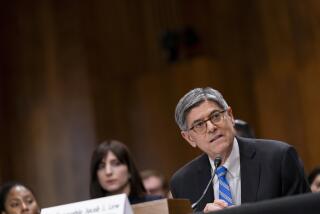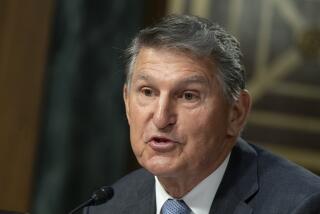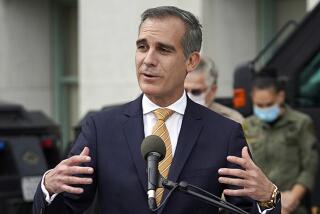Clinton to Fight for Weld Nomination
WASHINGTON — In a rare combative mood, President Clinton intends to defy Sen. Jesse Helms and to formally nominate Massachusetts Gov. William F. Weld as ambassador to Mexico, the White House announced Wednesday.
“The president is going to stand up and fight for Gov. Weld,” White House spokesman Mike McCurry told reporters. “The president looks forward to fighting hard for that nomination.”
Helms (R-N.C.), the chairman of the Senate Foreign Relations Committee, has made it known that he opposes Weld, a fellow Republican, with such vehemence that he will refuse to schedule any hearing on the nomination. Helms spokesman Marc Thiessen said Weld’s “record on drugs makes him unqualified for the post.”
The Clinton decision to take on Helms represents a change of strategy. In view of the warm relationship forged by Secretary of State Madeleine Albright with Helms, the administration has prided itself on knowing how to negotiate and compromise with the prickly senator. But the administration insists it is ready to do battle on this issue--even though Clinton has a long record of backing away from nominations that prove controversial.
The administration announced its intent to challenge Helms only after it received a challenge from the prospective nominee.
Weld let it be known almost a month ago that Clinton had asked him to serve as ambassador to Mexico. Helms promptly objected because Weld had advocated the medicinal use of marijuana and the distribution of clean needles to drug addicts as an AIDS-prevention measure.
After hearing nothing more from the administration, Weld held a news conference in Boston Monday and challenged Clinton to fight for the nomination. “I hope and expect that the president does not plan to give in to ideological extortion,” he said.
Denying that he was soft on drug policy, the governor, a moderate, said Helms, a conservative, opposed him strictly because “in plain language, I am not Sen. Helms’ kind of Republican.”
At the White House, McCurry attributed the administration’s delay in the nomination to bureaucratic checking and paperwork. “When finalized, it will be sent to the Hill” for consideration, he said.
Although McCurry talked about the president fighting for Weld, he made no boasts about prevailing. “We hope we can prevail in the Senate and see his nomination confirmed,” he said. “We understand that there’s an advise and consent process, and we’ll have to see how that plays out and how it’s reconciled with the president’s strong support for the nominee.”
Despite Helms’ opposition, the administration managed to obtain Senate confirmation of the chemical weapons treaty last April. To do so, Secretary of State Albright had to make enough changes in the treaty to persuade Helms and Senate Majority Leader Trent Lott (R-Miss.) to allow it to reach the Senate floor.
Asked if they hoped to enlist Lott’s support again to move the Weld nomination out of Helms’ committee, McCurry replied, “We will certainly have discussions with the majority leader about the status of the nomination.”
More to Read
Get the L.A. Times Politics newsletter
Deeply reported insights into legislation, politics and policy from Sacramento, Washington and beyond. In your inbox three times per week.
You may occasionally receive promotional content from the Los Angeles Times.










